This article needs additional citations for verification .(October 2008) |
"Chantez, Chantez" is a popular song written by Irving Fields (music) and Albert Gamse (lyrics), [1] which in 1957 was a Top 30 hit single for Dinah Shore.
This article needs additional citations for verification .(October 2008) |
"Chantez, Chantez" is a popular song written by Irving Fields (music) and Albert Gamse (lyrics), [1] which in 1957 was a Top 30 hit single for Dinah Shore.
Disappointed with her recent chartings, Shore had held "open houses" for composers at her residence to find strong material for her next single and through this process discovered "Chantez, Chantez" and also the song which served as its B-side: the Red Skipwine composition "Honky Tonk Heart". Shore premiered "Chantez, Chantez" on the 11 January 1957 broadcast of the Dinah Shore Chevy Show. Despite heavy promotion by Shore, "Chantez, Chantez" only just made the Top 30 of the Billboard Hot 100 at #27. [2]

"Lavender's Blue" is an English folk song and nursery rhyme dating to the 17th century. It has a Roud Folk Song Index number of 3483. It has been recorded in various forms since the 20th century and some pop versions have been hits in the US and UK charts.
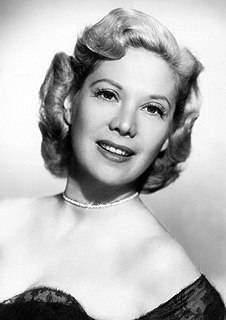
Dinah Shore was an American singer, actress, and television personality, and the top-charting female vocalist of the 1940s. She rose to prominence as a recording artist during the Big Band era. She achieved even greater success a decade later, in television, mainly as the host of a series of variety programs for the Chevrolet automobile company.
"Sweet Violets" is an American song that contains classic example of a "censored rhyme", where the expected rhyme of each couplet is replaced with an unexpected word which segues into the next couplet or chorus. For example, the first couplets go:
There once was a farmer who took a young miss
In back of the barn where he gave her a...
Lecture on horses and chickens and eggs
And told her that she had such beautiful...
Manners that suited a girl [etc.]

"I'm Gonna Make You Love Me" is a soul song most popularly released as a joint single performed by Diana Ross & the Supremes and The Temptations for the Motown label. This version peaked for two weeks at No. 2 on the Hot 100 in the United States, selling 900,000 copies in its first two weeks, and at No. 3 on the UK Singles Chart in January 1969.

"Theme from Mahogany" is a song written by Michael Masser and Gerry Goffin. It was initially recorded by American singer Thelma Houston in 1973, and then by Diana Ross as the theme to the 1975 Motown/Paramount film Mahogany.
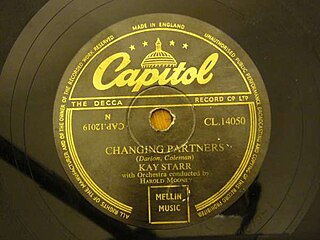
"Changing Partners" is a pop song with music by Larry Coleman and lyrics by Joe Darion, published in 1953. The best-known recording was made by Patti Page. It was also recorded the same year by Dinah Shore, Kay Starr and Bing Crosby.
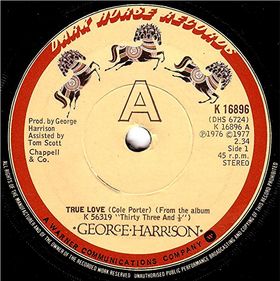
"True Love" is a popular song written by American songwriter Cole Porter, published in 1956. The song was introduced by Bing Crosby and Grace Kelly in the musical film High Society. "True Love" was nominated for the Academy Award for Best Original Song. Kelly's contribution on the record is relatively minor, duetting with Crosby on only the final chorus. Nonetheless, the single is co-credited to her.

"Hold Me, Thrill Me, Kiss Me" is a song written by Harry Noble and originally performed by Karen Chandler in 1952. It has been re-recorded several times since then, the most notable covers being by Mel Carter in 1965 and Gloria Estefan in 1994.
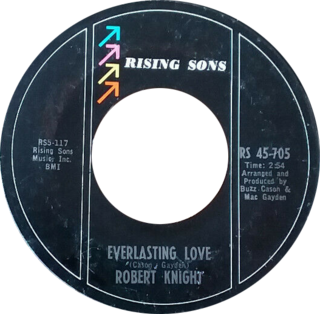
"Everlasting Love" is a song written by Buzz Cason and Mac Gayden, originally a 1967 hit for Robert Knight and since remade numerous times, most successfully by Love Affair, as well as Town Criers, Carl Carlton, Sandra Cretu, and Gloria Estefan. The original version of "Everlasting Love" was recorded by Knight in Nashville, with Cason and Gayden aiming to produce it in a Motown style reminiscent of the Four Tops and the Temptations. When released as a single, the song reached No. 13 on the US chart in 1967. Subsequently, the song has reached the US Top 40 three times, most successfully as performed by Carl Carlton, peaking at No. 6 in 1974, with more moderate success by the duo Rex Smith and Rachel Sweet and Gloria Estefan.
"My Heart Cries for You" is a popular song, adapted by Carl Sigman and Percy Faith from an 18th-century French melody.

"The Loco-Motion" is a 1962 pop song written by American songwriters Gerry Goffin and Carole King. "The Loco-Motion" was originally written for Dee Dee Sharp, but Sharp turned the song down. The song is notable for appearing in the American Top 3 thrice, each time in a different decade: in 1962 by the American pop singer Little Eva ; in 1974 by the American band Grand Funk Railroad ; and in 1988 by the Australian singer Kylie Minogue.

"Smoke Gets in Your Eyes" is a show tune written by American composer Jerome Kern and lyricist Otto Harbach for the 1933 musical Roberta. The song was sung in the Broadway show by Tamara Drasin. Its first recorded performance was by Gertrude Niesen, who recorded the song with orchestral direction from Ray Sinatra, Frank Sinatra's second cousin, on October 13, 1933. Niesen's recording of the song was released by Victor, with the B-side, "Jealousy", featuring Isham Jones and his Orchestra.

"Oh No Not My Baby" is a song written by Gerry Goffin and Carole King. The song's lyrics describe how friends and family repeatedly warn the singer about a partner's infidelities. The song is regarded as an American standard due to its long-time popularity with both music listeners and recording artists.

"Unforgettable" is a popular song written by Irving Gordon. The song's original working title was "Undeniable"; however, the music publishing company asked Gordon to change it to "Unforgettable". The song was published in 1951.
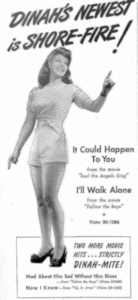
"I'll Walk Alone" is a 1944 popular song with music by Jule Styne and lyrics by Sammy Cahn. The song was written for the 1944 musical film Follow the Boys, in which it was sung by Dinah Shore, and was nominated for the Academy Award for Best Original Song but lost to “Swinging on a Star”. Shore recorded the song in March as a single, which became her first #1 hit on the Billboard charts.
"Wild One" or "Real Wild Child" is an Australian rock and roll song written by Johnny Greenan, Johnny O'Keefe, and Dave Owens. While most sources state that O'Keefe was directly involved in composing the song, this has been questioned by others. Sydney disc jockey Tony Withers was credited with helping to get radio airplay for the song but writer credits on subsequent versions often omit Withers, who later worked in the United Kingdom on pirate stations Radio Atlanta and, as Tony Windsor, on Radio London.
"A Lesson in Leavin'", also titled as "Lesson in Leavin"', is a song written by Randy Goodrum and Brent Maher. It was originally recorded in 1979 by American country music singer, Dottie West, for her Special Delivery album.

"Burn" is a song written by Tina Arena, Pam Reswick, and Steve Werfel for Arena's third album, In Deep (1997). The song was successful in her native Australia, reaching number two on the ARIA Singles Chart and earning a gold sales certification. At the time of its release, "Burn" was Australia's fastest-added single to radio. Arena also recorded the song in Spanish, and the Italian version, "Ti Voglio Qui", was released as a single in several countries in Europe.
"I Don't Hurt Anymore" is a 1954 song by Hank Snow. It was written by Don Robertson and Jack Rollins.

"We'll Never Have to Say Goodbye Again" is a song by Jeffrey Comanor from the album A Rumor in His Own Time, which debuted in September 1976. Written by Comanor, the song describes a couple who spend a night together, one which the narrator wishes would "never end". Both the song, which Epic Records released as a single, and album failed to chart.